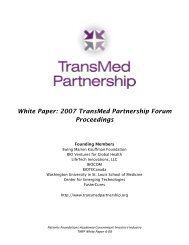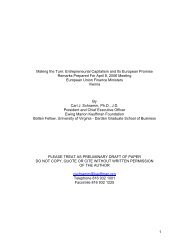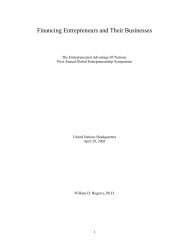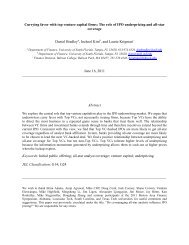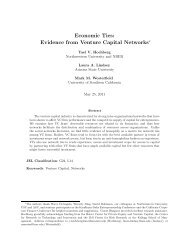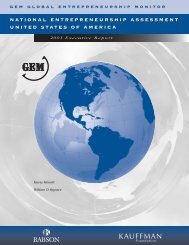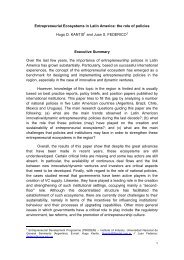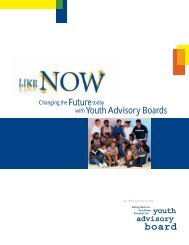Financing Child Care in the United States - Ewing Marion Kauffman ...
Financing Child Care in the United States - Ewing Marion Kauffman ...
Financing Child Care in the United States - Ewing Marion Kauffman ...
You also want an ePaper? Increase the reach of your titles
YUMPU automatically turns print PDFs into web optimized ePapers that Google loves.
SOCIAL AND HUMAN<br />
SERVICES<br />
RHODE ISLAND CHILD CARE<br />
ENTITLEMENT (RHODE ISLAND)<br />
DESCRIPTION<br />
Rhode Island has established a child care entitlement<br />
program to help pay <strong>the</strong> child care costs of families with<br />
limited earn<strong>in</strong>gs (at or below 250 percent of <strong>the</strong> federal<br />
poverty level, which is about $34,000 a year for a family<br />
of three).<br />
WHEN ESTABLISHED<br />
The child care entitlement was <strong>in</strong>itially established as part<br />
of welfare reform legislation, <strong>the</strong> Rhode Island Family<br />
Independence Act, enacted <strong>in</strong> August 1996. It was<br />
expanded (to raise <strong>the</strong> eligibility ceil<strong>in</strong>g and cover children<br />
age 13 to 16) as part of Start<strong>in</strong>g RIte legislation, which<br />
passed <strong>in</strong> 1998.<br />
ANNUAL AMOUNT<br />
Rhode Island estimated FY2000 expenditures of $42.4<br />
million (for approximately 9,000 children). Fund<strong>in</strong>g comes<br />
from <strong>the</strong> federal <strong>Child</strong> <strong>Care</strong> and Development Fund<br />
(CCDF), Temporary Assistance for Needy Families<br />
(TANF) fund transfer and state general revenues.<br />
SERVICES FUNDED<br />
The subsidies may be used to purchase any form of legal<br />
child care: centers, family child care homes, <strong>in</strong>–home<br />
child care or care provided by relatives. Parents choose<br />
<strong>the</strong> type of care <strong>the</strong>y prefer. Approximately 70 percent of<br />
subsidized children are cared for by regulated providers.<br />
HOW FUNDS DISTRIBUTED<br />
Funds are adm<strong>in</strong>istered as portable subsidies (vouchers),<br />
tied to a specific child and program. <strong>Child</strong> care providers<br />
are reimbursed by <strong>the</strong> Rhode Island Department of<br />
Human Services every four weeks. Co–payments are<br />
collected from families by <strong>the</strong> child care providers.<br />
POPULATION SERVED<br />
All families with <strong>in</strong>comes at or below 250 percent of<br />
poverty (about $34,000 for a family of three for 2000)<br />
are entitled to a child care subsidy. Families must be<br />
employed or <strong>in</strong> an education or tra<strong>in</strong><strong>in</strong>g program and<br />
have a child age 16 or younger who needs child care for<br />
all or part of <strong>the</strong> day. Families who are not participat<strong>in</strong>g <strong>in</strong><br />
Temporary Assistance for Needy Families (TANF) are<br />
required to contribute to <strong>the</strong> cost of child care through a<br />
co–payment. The co–payment is approximately 3 percent<br />
of gross <strong>in</strong>come for families with <strong>in</strong>comes between 100<br />
percent and150 percent of poverty and 2 percent of<br />
gross <strong>in</strong>come for families with <strong>in</strong>comes at or below <strong>the</strong><br />
poverty level.<br />
STRATEGIC CONSIDERATIONS<br />
• Rhode Island is <strong>the</strong> only state <strong>in</strong> <strong>the</strong> country <strong>in</strong> which<br />
child care is guaranteed to families based on <strong>in</strong>come<br />
alone, without reference to welfare status or time limits.<br />
Families are eligible if <strong>the</strong>y are work<strong>in</strong>g or enrolled <strong>in</strong><br />
education and tra<strong>in</strong><strong>in</strong>g programs.<br />
• Passage of <strong>the</strong> child care entitlement was a critical<br />
part of Rhode Island’s vision that child care and health<br />
care are <strong>the</strong> build<strong>in</strong>g blocks that must be <strong>in</strong> place to<br />
ensure successful, susta<strong>in</strong>able transitions to <strong>the</strong> work<br />
force.<br />
• In addition to provid<strong>in</strong>g child care as an employment<br />
support for low–<strong>in</strong>come families, Rhode Island is<br />
committed to ensur<strong>in</strong>g that all children have access to<br />
<strong>the</strong> high quality care and learn<strong>in</strong>g opportunities <strong>the</strong>y<br />
need to succeed <strong>in</strong> school and life. To this end, <strong>the</strong><br />
state <strong>in</strong>cluded an additional $7 million <strong>in</strong> <strong>the</strong> 1998<br />
Start<strong>in</strong>g RIte legislation to support several quality<br />
improvement <strong>in</strong>itiatives. These <strong>in</strong>cluded: improved<br />
provider reimbursement rates (to reach <strong>the</strong> 75th<br />
percentile—a 32 percent <strong>in</strong>crease); expanded tra<strong>in</strong><strong>in</strong>g<br />
for child care providers; support for early childhood<br />
program accreditation; <strong>in</strong>novation and start–up grants<br />
to expand <strong>the</strong> quality and supply of early childhood and<br />
school–age child care programs; and grants to expand<br />
<strong>the</strong> number of children that receive comprehensive<br />
services <strong>in</strong> Head Start and/or child care programs.<br />
• Strong leadership from Governor L<strong>in</strong>coln C. Almond (R),<br />
State Representative Nancy Benoit (D) and<br />
Department of Human Services Commissioner<br />
Christ<strong>in</strong>e Ferguson was <strong>in</strong>strumental <strong>in</strong> pass<strong>in</strong>g this<br />
legislation.<br />
OTHER SITES WITH SIMILAR STRATEGIES<br />
No o<strong>the</strong>r examples of a state elect<strong>in</strong>g to use general<br />
funds, CCDF and TANF funds for a child care entitlement<br />
are known.<br />
CONTACT<br />
Sherry Campanelli<br />
Associate Director<br />
Rhode Island Department of Human Services<br />
LP Build<strong>in</strong>g<br />
600 New London Avenue<br />
Cranston, RI 02920<br />
Phone (401) 462 2423<br />
E–mail scampane@gw.dhs.state.ri.us<br />
59




